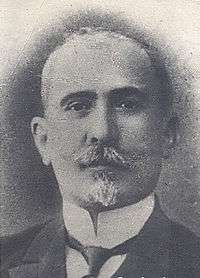Firidun bey Kocharli

Firidun bey Ahmad bey oglu Kocharli or Kocharlinski (Azerbaijani: Firidun bəy Köçərli[1]; Russian: Фиридун-бек Кочарлинский or Кочарли) (26 January 1863, in Shusha – 1920, in Ganja) was a prominent Azerbaijani writer, philologist and literary critic.
Life
Kocharli was born in 1863 in Shusha being the only child of Ahmad bey Kocharli. Firidun graduated from the local Russian-Muslim school and was admitted to the Transcaucasian Teachers Seminary in Gori. Upon receiving his diploma in 1885, he started teaching Azeri and religion at a Russian-Muslim school in Erivan.[2] In 1895 he was invited back to Gori to teach in his alma mater.[3]
He was one of the first Azeri literati to raise questions about standards for the written Azeri language. In 1895 he wrote his first article Tatar Comedies ("Tatar" was a common Russian name for Azeris before 1920), followed by Essays on Our Literature (1904). In 1903 he published his first academic work entitled Literature of the Azerbaijani Tatars, a critical piece that contains information on 130 Azeri writers and poets. In the following years he published some smaller works like Mirza Fatali Akhundov (1911) and Gift to Children (1912). Kocharli also translated works of European, mostly Russian authors into Azeri. His major academic work is Topics on the History of Azerbaijani Literature, which was published only in 1925, five years following his death. It was one of the first successful attempts to compile scientific data on the history and development of Azerbaijani literature.[3] Yusif Vazir Chamanzaminli, who greatly admired Kocharli, had published [4] in Istanbul in 1921. A copy of this book is in the Azerbaijan Republic State History Archives in Baku.
In 1917–1918 he was member of the Azerbaijani National Council. In 1918–1920 Kocharli was elected to the Parliament of the Azerbaijan Democratic Republic.
In spring 1920, during the Soviet invasion of the Azerbaijan Democratic Republic (1918-1920), Armenian dashnaks (members of the chauvinist Armenian party "Dashnaksutiun") pretending to be Bolsheviks, arrested Kocharli, who had no guilt, and took him to Ganja. After two days when special envoys were sent from Baku to Ganja to release Kocharli, it was late. Dashnaks had already killed him without holding a trial. At the time of his death, Kocharli was the Principal of the Gazakh Teachers Seminary that was founded in 1918 at his request.[2]
He was married to Badisabah Kocharli, née Vakilova, a Gazakh-native teacher who later worked in Baku, Zagatala and Shaki.[3]
Heritage
In the Soviet era, Kocharli's works remained largely unknown due to his political affiliation with the anti-Communist Musavat Party. It was not until 1957 when Bakir Nabiyev, a graduate student in the Azerbaijan State University, started researching the heritage of Kocharli accessing archives and interviewing some of his surviving colleagues and students. In 1960 Nabiyev published the first monograph dedicated to the contributions of Kocharli into scientific literature.[3]
References
- ↑ Azerbaijani Soviet Encyclopedia, Volume V, p.554
- 1 2 (Azerbaijani) Literaty Criticism by Shams Rufullayeva
- 1 2 3 4 (Russian) Firidun bey Kocharli: National Teacher and Outstanding Philologist by Galina Mikeladze. Azerbaijanskie Izvestia
- ↑ Yusif Bey Vazirov (Chamanzaminli), A Glimpse of Azerbaijan Literature (Istanbul: Istanbul Publishing House 1337 (1921), 103 pages. Azerbaijani language in Arabic script.
| Wikimedia Commons has media related to Firudin bey Kocharli. |